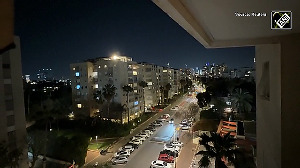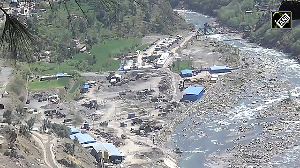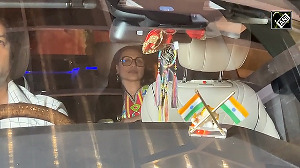In 2017, a retired R&AW officer conveyed that Uttar Pradesh Chief Minister Yogi Adityanath was keen to get monarchy restored in Nepal and suggested that I support these efforts.
A fascinating excerpt from S D Muni's Dabbling in Diplomacy -- Authorised & Otherwise: Recollections of a Non-Career Diplomat

In late 2003, Bamdev Chhetri, a Nepali national working in the JNU library, visited my home one day. He said Dr Baburam Bhattarai, who was then the Maoist second in-command, was in town and wanted to meet me urgently. He said that Baburam would not be able to come to JNU, because he is operating underground, so I will be taken to him tomorrow, whenever it is convenient to me.
Within a week of this meeting, Baburam suddenly came home one day unannounced. He wanted my help in meeting Sitaram Yechury and D P Tripathi, Both were in active politics and had access to leaders in India's political establishment. Sitaram Yechury was second in-command in the CPI-M party and Tripathi was one of the secretaries in the Nationalist Congress.
I said: 'Baburam, you have studied with them in the School of Social Sciences. They should meet you easily. I have had only a limited contact with them for being in the SIS.'
Baburam said he had been trying but they are not meeting him. In his presence, I called both Yechury and Tripathi one by one, but both expressed their inability to meet Baburam as 'this was a sensitive matter'.
In the following days, I broached the matter with the ORF president R K Mishra. He sounded sympathetic to the proposal, and said he would consult Pranab Mukherjee, a senior Congress leader.
After three to four days, Mishra conveyed to me that Pranab Mukherjee sought a written commitment from the Maoists, ensuring that their actions would not jeopardize India's core interests in Nepal. He referred particularly to the Maoists' campaign for revising the 1950 Treaty and the Gurkha recruitment agreement.
Baburam's response was that these demands were not invented by the Maoists; they had been longstanding issues reiterated by various political forces in Nepal, including the King.
After consulting with his leader, Pushpa Kamal Dahal, alias 'Prachanda', and other associates, Baburam provided the letter requested by Pranab Mukherjee. I passed on this letter to R K Mishra, but there was no response for weeks. When I enquired, Mishra mentioned the possibility of Pranab Mukherjee having second thoughts.
It was a very frustrating experience since nothing was working out. In desperation, I went to Brajesh Mishra in the PMO to request if the Maoists could be helped as they were willing to join the mainstream.
He asked me, 'What do they really want?' I said, "They want to remove monarchy, change the system and join the mainstream Nepal politics.' On the question of monarchy, Mishra reacted very sharply, got up from his seat and said, 'This is not possible. I have nothing more to talk on this issue.'
I pleaded with him to calm down, sit down and answer my one question, after which, I said I would leave. My question was: What has the King done to promote India's national interests? Is he not inviting China, Pakistan and Western powers to counter India in Nepal?
In response, after a pause, he sat down and said, 'Will they put in writing that they will not do anything that harms India's interests in Nepal?' The same commitment had been asked for by Pranab Mukherjee, so I said, "Yes they will do so.'
I was then asked to bring such a letter. After a couple of days, I got such a letter and personally handed it over to Brajesh Mishra. He warned me not to talk about this to anyone, and if I did, he would publicly deny this. I promised to respect his confidentiality as long as he was in power.
A few weeks later, during an official lunch for a foreign dignitary by the Prime Minister at Hyderabad House, I had the opportunity to meet Prime Minister Atal Bihari Vajpayee. On such occasions, guests are introduced to the visiting dignitary before settling down for lunch.
As I was making my way to the main hall for lunch, Prime Minister Vajpayee gestured for me to come over. He said, 'Muniji, we have got your message on Nepal. Will do something.' I did not hear from Mishra about the government's response to the Maoists' letter for a long time after that.

***
My contacts with the Maoists continued. Baburam introduced me to Prachanda, and both of them used to come home for discussions. Prachanda also came with his wife, the late (Mrs) Sita Dahal, to our residence in JNU for dinner a couple of times. In my long discussions with the Maoist duo, it became clear that the Maoists had come to realise that there was no final military solution to their 'Peoples' War'.
During these meetings with the Maoists, I received anonymous calls twice, asking me to keep away from Nepal Maoists otherwise I may be detained under India's draconian Prevention of Terrorism Act (POTA). I never knew who the callers were, but suspected them to be from India's Intelligence Bureau.
I ignored these calls in the belief that I was doing something in India's national interest. One of the influential Nepali Congress leaders and a friend, Sagar Shumsher Rana, who had close family links with the senior RNA officers, told me years later that in the RNA's intelligence assessment, a good deal of the Maoists' strategy was finalised in consultation with me.
The situation turned into a crisis when in February 2005, King Gyanendra staged a coup. He terminated even his pliant prime minister and took control of power himself directly. He detained all the political leaders and imposed emergency. He also doubled the strength of RNA and unleashed it against the Maoists as well as political parties.
Gyanendra's use of army against the Maoists, his public claim to finish the Maoist insurgency in six months and repression against the political parties facilitated the political parties getting together with the Maoists.

India's role was critical in opposing the king's autocratic moves and forcing him to accept the demands for democratisation. Prime Minister Dr Manmohan Singh, on three different occasions in one-on-one discussions, asked Gyanendra to accommodate the mainstream parties and restore democratic functioning. The king would agree to do so every time, but would not act on this advice.
Frustrated by the king's obstinacy, India helped in the finalisation of the 12-Point Agreement. Foreign Secretary Shyam Saran and R&AW chief P K Hormis Tharakan helped soften India's attitude towards the mainstreaming of the Maoists and the conclusion of the 12-Point Agreement.
Resistance to the accommodation of the Maoists had come from M K Narayanan, India's national security adviser, and Pranab Mukherjee, who assumed the charge of defence minister.
In April 2006, the situation in Nepal became volatile with massive protest demonstrations against the King and refusal on his part to yield.
Fearing outbreak of massive violence, India directly intervened, sending its special envoy, Dr Karan Singh, assisted by Shyam Saran, to persuade the king to yield.
India distanced itself from the king and compromised on its two-pillar policy primarily because the king was not executing his promises to India on restoring the parliamentary system and joining hands with the mainstream parties.
He was insistent on his military approach to deal with the Maoists, which in India's assessment was a futile and undesirable attempt. For dealing militarily with the Maoists, the king was also collecting arms from China and Western sources which were a red herring to India.

Dr Karan Singh was chosen as special envoy to persuade the king as a last attempt, in view of his close relationship with Nepal's royal family. He had his one-on-one meeting with the king, while Shyam Saran had a separate one-on-one meeting with Nepal's then army chief, General Pyar Jung Thapa.
We learnt through different sources that Dr Singh, while persuading the king to give up direct rule and restore the dissolved Parliament, probably, gave assurances to the king that India will not support complete abolition of monarchy as demanded by the Maoists.
Later, I also learnt through Shyam Saran that he had a difficult time persuading General Thapa to convince the king that military action against the 'Peoples' Movement' was not the solution and will not be allowed.
It was only after this message that the king conceded what Dr Singh was asking for. He issued a half-hearted proclamation on 21 April 2006 to restore Parliament and for a new prime minister to be appointed by him.
The 'Peoples' Movement had already resulted in some violence and more violence was feared if the agitation was to be prolonged and enhanced. This forced the king to issue another proclamation on 24 April, 2006 which restored the Parliament without any caveats and reinstated G P Koirala as the prime minister. All the political parties heartily praised the role played by India in the success of their movement.
One Dr Asarfi Shah used to meet me both in Kathmandu and New Delhi to seek my support for the king. During a meeting in my IDSA office, Dr Shah once bragged that the Indian establishment, under the Narendra Modi regime, had assured the king that monarchy and Hinduism represent two faces of the same coin that India would support in Nepal.
It is, however, not in my DNA to support autocratic monarchy. I made this stance clear to Dr Shah on every occasion.
In 2017, a retired R&AW officer, whom I knew for many years because of our common Rajasthani origin, invited me for lunch at the Delhi Gymkhana Club. He conveyed that Uttar Pradesh Chief Minister Yogi Adityanath was keen to get monarchy restored in Nepal and suggested that I support these efforts. I firmly communicated that he had approached the wrong person for a wrong cause.

***
Weeks before Prachanda's first visit to India after assuming the office of prime minister in 2008, the National Security Council in India was preparing a profile of the visiting dignitary.
Prachanda had defied the long tradition of Nepali prime ministers undertaking their first foreign visit to India, He went to China first to participate in the concluding function of the Beijing Olympics. Ambassador Leela Ponappa, Deputy National Security Adviser, called me in Singapore to get my input on Prachanda's personality.
I said: 'Prachanda is a highly motivated and ambitious power seeker. Beneath the ideological cover, he is a hardcore pragmatist and would cut a deal with anyone who will help him acquire and sustain power. He is very slippery also and may not stick to the deal until its full implementation if, at any point, he finds it going against his core interests.'
I was in Delhi to attend a family function when Prachanda's visit took place in September 2008. 1 visited him in Maurya ITDC Hotel on Sardar Patel Road.
Briefing me on the course of his visit he said, one of the important sticking points in his talks with the Indian authorities was the integration of Peoples' War soldiers in the Nepal Army. I alerted him that he should agree on that specific figure for integration, and that specific process which he can honestly and efficiently implement. It did not happen.
He agreed on a number, I think 4,000 plus, but did not carry out the process after his return to Kathmandu. This added to the trust deficit between Prachanda and the New Delhi establishment.
I tried later also to persuade Baburam and Prachanda to close their differences. In my view, both were complementary to each other; Baburam for his intellectual sharpness, broader vision and ideological resilience, and Prachanda for his organisational command and practical approach.

During Baburam's tenure as prime minister, I met both of them over a private dinner at the prime minister's residence in Baluwatar, Kathmandu. India's ambassador, Jayant Prasad, was also in attendance. During the dinner, I emphasised to both of them that it was crucial for them to collaborate closely for their personal benefit, the political well-being of the Maoists, and the national interest of Nepal.
Despite their repeated assurances of commitment to working together, the reality was that they struggled to overcome their differences. This was primarily attributed to a significant clash of personalities and egos, combined with a deep-seated power struggle that originated with the establishment of the Maoist party in the early 1990s.
Baburam eventually left the Maoists and formed his own party called Naya Shakti Party in 2016, which proved to be a futile effort. He has been moving from one grouping to another in search of a viable political constituency. He is primarily an ideologue without the political acumen needed for an organisational leader.
It is difficult to say with certainty if India contributed in any way to fuel the differences between Baburam and Prachanda to weaken and destroy the Maoists.
I am aware that there were two views in the Indian establishment when Baburam emerged as the prime-ministerial candidate in 2011. While the PMO and the Indian embassy in Kathmandu supported him, Pranab Mukherjee was calling Nepal's President Dr Ram Baran Yadav not to let Baburam become prime minister.
India's approach to Nepali politics has often been ad hocist and personality oriented. During his term as prime minister, Baburam once complained that India was exercising undue pressure on him regarding bureaucratic decisions and delaying many of the developmental projects initiated by him.

***
Power struggles and ego clashes among Nepali leaders have made most of the power-sharing arrangements fragile, adversely affecting political stability in Nepal and souring its relations with India.
This was the case when the then prime minister (K P Sharma) Oli, in May 2020, brought up the issue of a border dispute with India in the Lipulekh-Kalapani area. Internally, he was facing significant challenges within his party due to his failure to honour the power-sharing agreement with Prachanda.
He raised the border issue and whipped up anti-Indian nationalism to gamer political support for his leadership, both within his party and within the country. When he found that the issue was becoming difficult to manage, he sought a resolution with India.
His US ambassador Arjun Karki sent me a message from Washington, DC, asking if I could help in this respect. I conveyed Oli's message, received through Arjun Karki, to External Affairs Minister Dr S Jaishankar on 25 May 2020.
Following this, India's ambassador in Kathmandu also became actively involved in addressing the issue. A telephonic conversation was arranged between Oli and Modi. However, Oli did not respect the sanctity and confidentiality of this arrangement.
Before talking to his Indian counterpart on the issue as agreed, he released an official map displaying the disputed area in Nepal. This resulted in a breakdown of communication at the highest political level, leading to Oli's move for a constitutional amendment to endorse the altered map.
This helped him survive politically, but at the cost of vitiating relations with India for many years to come.
Excerpted from Dabbling in Diplomacy--Authorised & Otherwise: Recollections of a Non-Career Diplomat, with the kind permission of Konark Publishers Pvt Ltd.
Feature Presentation: Aslam Hunani/Rediff.com











 © 2025
© 2025